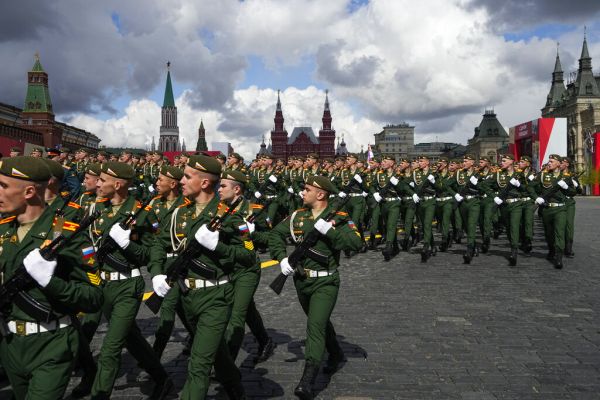Russian President Vladimir Putin’s much-anticipated speech offered no new insights into how he intends to salvage the grinding war.
By Associated Press
Russian President Vladimir Putin used his country’s biggest patriotic holiday Monday to again justify his war in Ukraine but did not declare even a limited victory or signal where the conflict is headed, as his forces pressed their offensive with few signs of significant progress.
The Russian leader oversaw a Victory Day parade on Moscow’s Red Square, with troops marching in formation and military hardware on display to celebrate the Soviet Union’s role in the 1945 defeat of Nazi Germany.
But his much-anticipated speech offered no new insights into how he intends to salvage the grinding war, and instead stuck to allegations that Ukraine posed a threat to Russia, even though Moscow’s nuclear-armed forces are far superior in number and firepower.
“The danger was rising by the day,” Putin said. “Russia has given a preemptive response to aggression. It was forced, timely and the only correct decision.”
He steered clear of battlefield specifics, failing to mention the potentially pivotal battle for the vital southern port of Mariupol and not even uttering the word “Ukraine.”
On the ground, meanwhile, intense fighting raged in Ukraine’s east, the vital Black Sea port of Odesa in the south came under bombardment again, and Russian forces sought to finish off the Ukrainian defenders making their last stand at a steel plant in Mariupol.
Putin has long bristled at NATO’s creep eastward into former Soviet republics, and argued Monday that Russia had to invade Ukraine before an “inevitable” clash. Ukrainian leaders and their Western backers have denied that Kyiv or NATO posed any threat.
As he has done all along, Putin falsely portrayed the fighting as a battle against Nazism, thereby linking the war to what many Russians regard as their finest hour: the triumph over Nazi Germany. The Soviet Union lost 27 million people in what Russia refers to as the Great Patriotic War.
He also sought to depict the offensive underway for control of the Donbas region in the east — Moscow’s focus after its abortive attempt to storm the capital, Kyiv — as a fight on Russia’s “historic lands.” He has long sought to deny Ukraine’s own thousand-year history.
Progress in the east, though, has been slow-going, and many analysts had suggested Putin might use his speech to declare some sort of victory — potentially in Mariupol — as a way to counter Russia’s heavy battlefield losses and the punishing effects of Western sanctions at home.
Others suggested he might declare the fighting a war, not just a “special military operation,” and order a nationwide mobilization, with a call-up of reserves, to replenish the depleted ranks for an extended conflict.
Neither step was announced.
Critics said the speech skirted some uncomfortable realities that Putin is facing: With the campaign in Ukraine faltering, he has not asked Russians to accept sacrifices to weather the sanctions and diplomatic isolation.
He also left unanswered the question of whether and how Russia will marshal more forces in the face of significant losses.
“Without concrete steps to build a new force, Russia can’t fight a long war, and the clock starts ticking on the failure of their army in Ukraine,” tweeted Phillips P. O’Brien, professor of strategic studies at the University of St. Andrews in Scotland.
Despite Russia’s efforts to crack down on dissent, antiwar sentiment has seeped through. A few scattered protesters were detained around the country on Victory Day, and editors at one pro-Kremlin media outlet revolted by briefly publishing a few dozen stories criticizing Putin and the invasion.
In Warsaw, antiwar protesters splattered Russia’s ambassador to Poland with what appeared to be red paint as he arrived at a cemetery to pay respects to Red Army soldiers who died during World War II.
As Putin laid a wreath in Moscow, air raid sirens echoed again in the Ukrainian capital. But Ukrainian President Volodymyr Zelensky declared in his own Victory Day address that his country would eventually defeat the Russians.
“Very soon there will be two Victory Days in Ukraine,” he said in a video. He added: “We are fighting for freedom, for our children, and therefore we will win.”
The Ukrainian military warned of a high probability of missile strikes on the holiday, and Britain’s Defense Ministry said in its daily assessment that Russian forces could increasingly subject Ukrainian towns and cities to “intense and indiscriminate bombardments with little or no regard for civilian casualties” as they run short of precision-guided weapons.
More than 60 people were feared dead over the weekend after Russian bombardment flattened a Ukrainian school being used as a shelter in Bilohorivka, an eastern village, Ukrainian officials said.
With the war in its 11th week, battles were being waged on multiple fronts, but Russia was perhaps closest to a victory in Mariupol.
The fall of Mariupol would deprive Ukraine of a vital port, allow Russia to complete a land corridor to the Crimean Peninsula, and free up troops to fight elsewhere in the Donbas. It would also give the Kremlin a badly needed success.
Russian forces pounded away over the weekend at the plant, where as many as 2,000 Ukrainian fighters are believed to be holding out.
Odesa, too, has increasingly come under bombardment in recent days. Ukrainian officials said Russia fired four cruise missiles targeting the southern city Monday from Crimea. It said no civilians were wounded but did not elaborate on what was struck.
The war in the country long known as the “breadbasket of Europe” has disrupted global food supplies.
“I saw silos full of grain, wheat and corn ready for export,” Charles Michel, president of the European Council, lamented in a tweet after a visit to Odesa. “This badly needed food is stranded because of the Russian war and blockade of Black sea ports. Causing dramatic consequences for vulnerable countries.”





